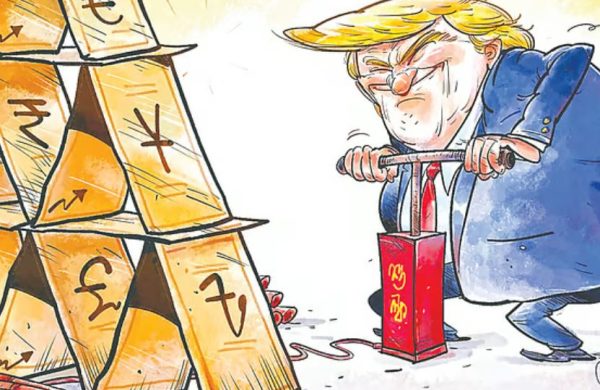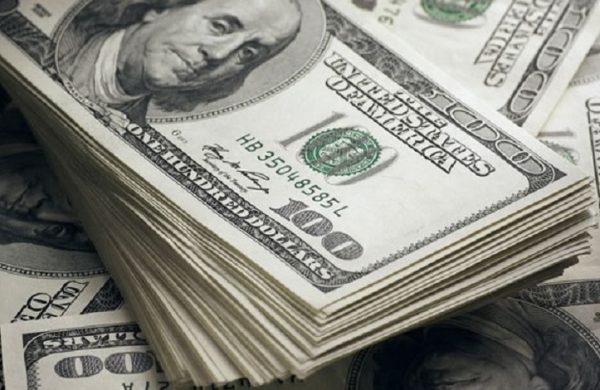Trump’s reciprocal tariff shake-up threatens Bangladesh exports
- Update Time : Friday, April 4, 2025

Staff Correspondent:
The administration of US President Donald Trump has imposed a new 37 per cent reciprocal tariff on Bangladeshi products. Previously, the US had an average tariff of 15 per cent on imports from Bangladesh. Exporters fear that this significant hike will deal a major blow to Bangladesh’s exports, particularly in the readymade garment sector, as the United States is the destination for 18 per cent of the country’s total exports.
Trump’s reciprocal tariffs have not been imposed solely on Bangladesh but on multiple countries worldwide, causing a global stir. Stock market indices have plummeted across various financial hubs, gold prices have reached record highs, and fuel oil prices have dropped. In short, Trump’s reciprocal tariff measures have thrown the global economy into uncertainty, raising concerns that they could significantly alter international trade dynamics.
World leaders have reacted strongly to Trump’s announcement, with international media outlets such as BBC, CNN, and The New York Times covering the developments. The European Union (EU) has described the decision as a major blow to the global economy. Australia has labelled it unfriendly. UK Prime Minister Keir Starmer has stated that the economic impact of this move will undoubtedly be felt. China has vowed to retaliate by imposing its own reciprocal tariffs, signaling the start of a potential trade war.
However, Trump had already hinted at such measures before beginning his second term as US president. He officially announced the new tariff policy at 4:00 pm local time on Wednesday (2:00 am Bangladesh time on Thursday) from the Rose Garden of the White House. During the announcement, he stated:
“For a long time, other countries have been taking advantage of our weak rules and regulations to rob the United States—but not anymore. We will now impose retaliatory tariffs on those countries. This will create jobs, revitalise industries, and support small and medium-sized businesses. Our goal is to make America rich again.”
HIGHER THE TRADE DEFICIT, HIGHER THE TARIFFS
US President Donald Trump has imposed higher reciprocal tariffs on countries with which the US has a larger proportional trade deficit. As a result, many Asian countries have been hit with steep tariffs. However, an average tariff of 10 per cent has been applied to products from all countries worldwide.
The US administration has used a formula to determine these reciprocal tariffs. The tariff rate is calculated as a percentage of a country’s trade deficit with the US, divided by the total US imports from that country. The final tariff imposed is half of that percentage.
According to the website of the US Trade Representative’s Office, Bangladesh exported goods worth USD 8.36 billion to the United States in 2024, while importing USD 2.21 billion worth of goods from the US This results in a US trade deficit of USD 6.15 billion with Bangladesh. Applying the Trump administration’s formula, the calculated tariff rate is 74 per cent, with half of that—37 per cent—being imposed on Bangladeshi products.
The United States has its largest trade deficit with China, amounting to USD 292 billion. Since 13 per cent of total US imports come from China, a new 34 per cent tariff has been imposed on Chinese products. Similarly, the US trade deficit with the European Union (EU) stands at USD 241 billion, with the EU accounting for 18.5 per cent of total US imports. As a result, a 20 per cent reciprocal tariff has been imposed on EU products.
Among other Asian nations, India has been hit with a 26 per cent reciprocal tariff. Meanwhile, the US has imposed a 46 per cent tariff on Vietnamese products, 32 per cent on Indonesian products, 29 per cent on Pakistani products, and 44 per cent on products from Sri Lanka and Myanmar.
Consequently, Bangladesh’s competitors—India, Indonesia, and Pakistan—have received comparatively lower tariff rates under Trump’s new trade policy.
WORLD TRADE WILL CHANGE
The core principle behind Donald Trump’s reciprocal tariffs is to reduce the US trade deficit. The Trump administration believes that higher import tariffs will boost government revenue while encouraging companies to restructure their supply chains. As a result, many businesses may shift their production facilities to the United States or relocate to duty-free zones.
Analysts suggest that these tariffs will lay the foundation for future trade negotiations. The US government is expected to collect an additional USD 700 billion annually from these tariffs—an increase of a scale not seen since World War II. However, the ultimate impact will depend on the purchasing power of American consumers.
Trump’s tariff policy also conflicts with the rules and regulations of the World Trade Organization (WTO), raising concerns about its legality and long-term implications. This has already sparked debates over the effectiveness and future role of the WTO in global trade governance.
IMPACT ON BANGLADESH’S EXPORTS
Eighty per cent of Bangladesh’s exports consist of readymade garments, and the United States is the single largest market for those exports. In the 2023–24 fiscal year, 18 per cent of Bangladesh’s readymade garments were exported to the US As a result, exporters in the sector are deeply concerned about the newly imposed reciprocal tariffs under President Donald Trump’s administration.
Although President Trump has imposed reciprocal tariffs on all major garment-exporting countries, Mexico remains an exception. The US had already imposed a 25 per cent tariff on Mexican products last February, and no new tariff was applied this time.
Garment exporters fear that the new counter-tariffs on all exporting countries will increase the prices of readymade garments in the US market. This could lead to a decline in consumer demand. Additionally, buyer companies may push manufacturers to reduce prices to offset the increased cost, placing small and medium-sized entrepreneurs under severe pressure.
According to the Office of Textiles and Apparel (OTEXA) under the US Department of Commerce, the top readymade garment exporters to the US include China, Vietnam, Bangladesh, Indonesia, India, Mexico, Honduras, Cambodia, Pakistan, and South Korea. Among these, lower reciprocal tariffs have been imposed on China, India, Indonesia, Honduras, Mexico and South Korea compared to Bangladesh.
Bangladesh has consistently ranked as the third-largest exporter of readymade garments to the US market. In 2024, Bangladesh exported garments worth USD 7.34 billion to the United States—an increase of 73 per cent compared to the previous year. The average price per square meter of garments exported from Bangladesh was USD 3.10.
When contacted, Mohammad Hatem, President of the Bangladesh Knitwear Manufacturers and Exporters Association (BKMEA), told That, “The reciprocal tariffs will have a major impact on our garment exports. Bangladesh should urgently initiate talks at the government level to negotiate tariff reductions. We manufacture garments using US-imported cotton, and a large portion of those garments are exported back to the United States. Therefore, the government could seek duty-free access for products made with US raw materials.”
Other export sectors—such as leather goods, home textiles, frozen fish and shrimp and jute products—may also suffer under the new US tariffs. Last fiscal year, Bangladesh earned USD 210 million from leather goods exports, USD 50 million from home textiles, and USD 16.4 million from frozen fish and shrimp.
Anwar-ul-Alam Chowdhury Parvez, former president of the BGMEA, also told that, “If the reciprocal tariffs imposed by US President Donald Trump remain in effect, some garment orders may shift to India and Pakistan. There is concern that orders for items like heavy jerseys, denim pants and home textiles will go to those countries due to their lower tariff rates.”
Trade Advisor Sheikh Bashiruddin held an emergency meeting on Thursday afternoon in response to the imposition of reciprocal tariffs by the United States. Speaking to that, the Trade Advisor said he met with Commerce Secretary Mahbubur Rahman, National Board of Revenue (NBR) Chairman Abdur Rahman Khan, and Export Promotion Bureau (EPB) Vice Chairman Anwar Hossain.
“Many aspects of the reciprocal tariffs are still unclear to us,” said the Trade Advisor. “The government will gather all necessary information and take appropriate steps to ensure that our export sector does not suffer.”
Meanwhile, Finance Advisor Salehuddin Ahmed has called a meeting with stakeholders on Sunday to determine the course of action. This information was confirmed by sources in the ministry.
When asked about how Bangladesh should respond to the situation, Khondaker Golam Moazzem, Research Director at the private research institute Centre for Policy Dialogue (CPD), told that, “The Ministry of Commerce and the Ministry of Foreign Affairs must closely monitor the evolving scenario. They should observe what strategies other affected countries are adopting. No hasty agreements or promises should be made. This challenge must be addressed through effective and well-thought-out initiatives.”















